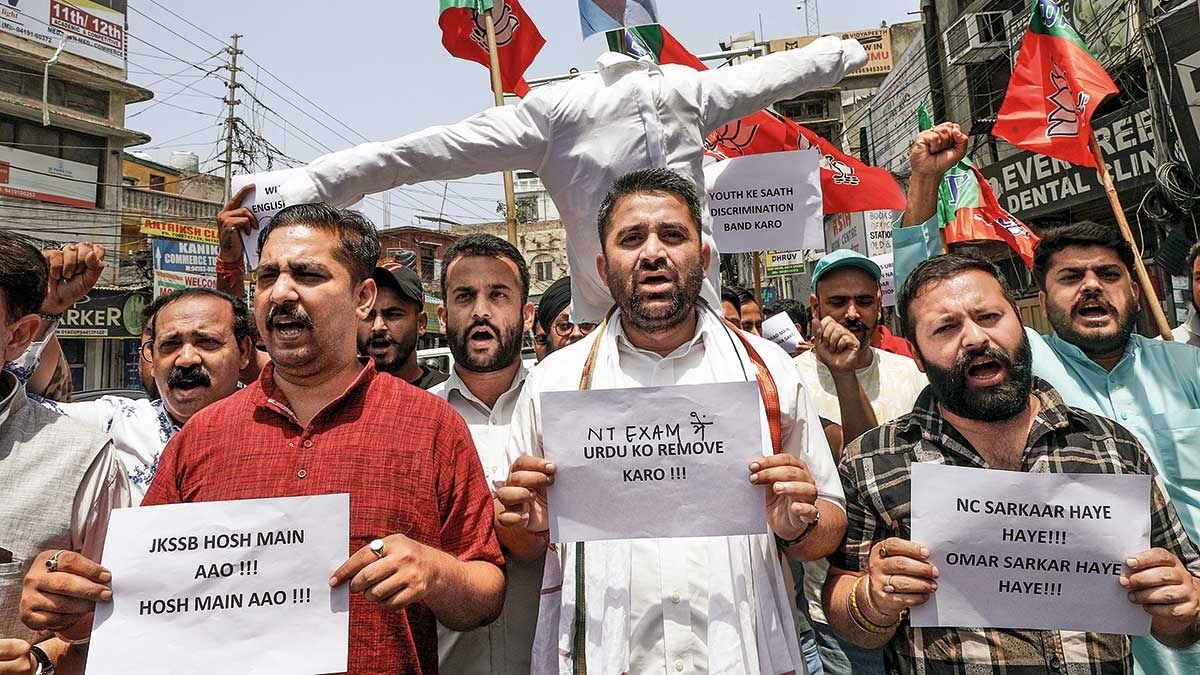Urdu Row in J&K: Omar Abdullah, Mehbooba Mufti Defend Language Amidst BJP Opposition
By: Javid Amin | Srinagar | 16 July 2025
Omar Abdullah and Mehbooba Mufti Defend Urdu Amidst Legal and Political Storm
In the politically sensitive terrain of Jammu & Kashmir, even language is no longer neutral. The recent uproar over Urdu proficiency requirements for the Naib Tehsildar posts has laid bare deep fissures—between regions, ideologies, and visions for J&K’s future.
What began as a technical eligibility clause has now become a hotbed of communal tension, administrative debate, and political positioning.
The Case for Urdu: Legacy, Logic & Law
Both Chief Minister Omar Abdullah and former CM Mehbooba Mufti have come out strongly in defense of the Urdu requirement. For them, the rationale isn’t emotional—it’s administrative and historical.
Omar Abdullah’s Position:
“Revenue records in J&K have been maintained in Urdu since before 1947. If you can’t read or understand these records, how can you perform your duty as a revenue officer?”
Omar’s argument is grounded in institutional continuity. Unlike other Indian states where land records have been digitized and translated, J&K’s bureaucracy still relies heavily on Urdu-based administrative documentation, especially in rural areas.
Mehbooba Mufti’s Warning:
“Urdu is being unfairly communalized. It is the administrative spine of Jammu & Kashmir—not a religious imposition.”
Mufti further argued that targeting Urdu is a political maneuver, aimed at alienating Kashmiri identity and rewriting the cultural foundations of the Union Territory.
Legal Pushback: The CAT Order That Shook the Valley
The controversy reached a boiling point when the Central Administrative Tribunal (CAT) issued a stay on the mandatory Urdu clause in June 2025.
CAT’s Direction:
-
Urdu cannot be the sole mandatory language for Naib Tehsildar exams.
-
The J&K Services Selection Board (JKSSB) must accept candidates proficient in any of the five official languages: Urdu, Hindi, Dogri, Kashmiri, or English.
This ruling was welcomed by many in Jammu’s Dogri-speaking belt, where candidates saw the Urdu mandate as a barrier to entry and a bias toward Kashmir-based aspirants.
BJP’s Reaction: “Linguistic Bias Disguised as Heritage”
The BJP youth wing and leaders from Jammu responded with protests, celebratory rallies, and demands for permanent removal of the Urdu requirement.
BJP’s Argument:
-
The Urdu clause was regionally biased, favoring Kashmir Valley candidates.
-
Urdu’s prominence is a remnant of “appeasement-era politics”, disconnected from Jammu’s aspirations.
Sunil Sethi, BJP spokesperson, declared:
“This isn’t about efficiency. It’s about linguistic hegemony and political favoritism.”
The Identity Debate: Is Urdu Religious or Regional?
For decades, Urdu in J&K has existed above religious lines—used in administration, literature, courts, police records, and media. However, the current BJP narrative frames Urdu as an Islamic symbol, challenging its neutrality.
PDP’s Waheed ur Rehman Para wrote:
“Urdu is the throbbing pulse of Jammu & Kashmir’s identity… the BJP’s communal lens threatens to unravel a cultural fabric that has united diverse communities.”
Indeed, Urdu has historically been:
-
The language of poets like Mahjoor and Faiz.
-
The court language for over 150 years.
-
A neutral linguistic bridge between Hindus, Muslims, and Sikhs.
Political Undercurrents: Who Gains, Who Loses?
Sajad Lone’s Take:
The People’s Conference chief also defended Urdu, but with a strategic caveat:
“Knowing Urdu gives our youth a competitive advantage. Diluting that is not reform—it’s regression.”
His remarks underscore the Valley’s quiet anxiety: that weakening Urdu’s role will eventually reduce job access and cultural representation for Kashmiris.
National Conference’s Worry:
Some party insiders warn that removing Urdu could become a precedent, eventually sidelining Kashmiri and Dogri too—paving the way for linguistic homogenization under Hindi and English.
Beyond Language: The Battle for Bureaucratic Identity
This issue goes far beyond eligibility criteria—it’s about who gets to write the rules in post-Article 370 Kashmir:
-
Should historic continuity matter in new administrative frameworks?
-
Are local languages expendable in the name of “national integration”?
-
Can a language that once united communities now be used to divide them?
What’s Next: A Legal and Political Tug-of-War
While the CAT order has temporarily halted Urdu exclusivity, the J&K government may appeal the decision or seek a compromise:
-
Some suggestions include making Urdu optional but advantageous—i.e., giving extra marks or preference to Urdu-knowing candidates.
-
Others propose a gradual translation and digitization of Urdu records to level the playing field.
But neither side looks ready to back down just yet.
Why This Matters: Language as a Proxy for Power
The Urdu debate is not just an exam eligibility issue. It is a mirror to the larger struggles of Kashmir:
-
Cultural identity vs. national conformity
-
Valley vs. Jammu politics
-
Federal rights vs. centralized control
In every society, language is power—to access, to govern, to preserve heritage. In Kashmir, it may well decide who gets to define the future.




